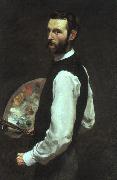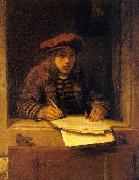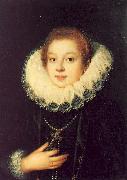
|
Frederic Bazille
|
|||
|
|
|||
| b.Dec. 6, 1841, Montpellier, France d.Nov. 28, 1870, Beaune-la-Rolande French Frederic Bazille Galleries was a French Impressionist painter best known for his depiction of figures. Born in Montpellier, Herault, Languedoc-Roussillon, into a middle-class Protestant family, Bazille became interested in painting after seeing some works of Eugene Delacroix. His family agreed to let him study painting, but only if he also studied medicine. Bazille began studying medicine in 1859. He moved to Paris in 1862 to continue his studies. There he met Pierre-Auguste Renoir, was drawn to Impressionist painting, and began taking classes in Charles Gleyres studio. After failing his medical exam in 1864, he began painting full-time. His close friends included Claude Monet, Alfred Sisley, and Édouard Manet. Born to a wealthy family, Bazille helped support some of these artists by giving them space in his studio and materials to use. Bazille was just twenty-three years old when he painted several famous works, including The Pink Dress. His best known painting is Family Reunion (1867?C1868). | |||
|
|
|||
|
Self Portrait Frederic Bazille3.jpg Painting ID:: 34 |
1865-66 The Art Institute of Chicago | ||
|
|
|||
|
Daret, Jean
|
|||
|
|
|||
| Flemish Baroque Era Painter, 1613-1668 French painter. He came from Brussels and trained there before going on the traditional journey to Italy, which not only took him to Rome but also brought him into contact with contemporary masters at Bologna. While in Italy he produced a Self-portrait (1636; St Petersburg, Hermitage), which alludes to both his ideal model and the necessary basis of his work: his right hand rests on a fragment of antique sculpture, while beside his palette in the foreground lie several sheets of drawings. | |||
|
|
|||
|
Self Portrait new3/Daret, Jean_6232WX.jpg Painting ID:: 18970 |
1636, oil on canvas, The Hermitage, St. Petersburg | ||
|
|
|||
|
Titian
|
|||
|
|
|||
|
|
|||
|
Self Portrait Titian24.jpg Painting ID:: 1697 |
1567-68 Museo del Prado, Madrid | ||
|
|
|||
|
Samuel Dircksz van Hoogstraten
|
|||
|
|
|||
| 1627-1678 Flemish Samuel Dircksz Van Hoogstraten Galleries | |||
|
|
|||
|
Self Portrait Samuel Dircksz van Hoogstraten2.jpg Painting ID:: 2412 |
The Hermitage, St.Petersburg | ||
|
|
|||
|
Sofonisba Anguissola
|
|||
|
|
|||
| Italian 1532-1625 Sofonisba Anguissola was born in Cremona, Lombardy around 1532, the oldest of seven children, six of whom were daughters. Her father, Amilcare Anguissola, was a member of the Genoese minor nobility. Sofonisba's mother, Bianca Ponzone, was also of an affluent family of noble background. Her mother died when Sofonisba was four or five. Over four generations, the Anguissola family had a strong connection to ancient Carthaginian history and they named their offspring after the great general Hannibal, thus the first daughter was named after the tragic Carthaginian figure Sophonisba. Amilcare Anguissola encouraged all of his daughters (Sofonisba, Elena, Lucia, Europa, Minerva and Anna Maria) to cultivate and perfect their talents. Four of the sisters (Elena, Lucia, Europa and Anna Maria) became painters, but Sofonisba was by far the most accomplished and renowned. Elena became a nun (Sofonisba painted a portrait of her) and had to quit painting. Both Anna Maria and Europa gave up art upon marrying, while Lucia Anguissola, the best painter of Sophonisba's sisters, died young. The other sister, Minerva, became a writer and Latin scholar. Asdrubale, Sophonisba's brother, studied music and Latin but not painting. Self-portrait, 1554Her aristocratic father made sure that Sofonisba and her sisters received a well-rounded education that included the fine arts. Anguissola was fourteen years old when her father sent her with her sister Elena to study with Bernardino Campi, a respected portrait and religious painter of the Lombard school, also from Cremona, Sofonisba's home town. When Campi moved to another city, Sofonisba continued her studies with the painter Bernardino Gatti (known as Il Sojaro). Sofonisba's apprenticeship with local painters set a precedent for women to be accepted as students of art.[citation needed] Dates are uncertain, but Anguissola probably continued her studies under Gatti for about three years(1551-1553). Sophonisba's most important early work is Bernardino Campi Painting Sofonisba Anguissola (c 1550 Pinacoteca Nazionale, Siena). The double portrait depicts her art teacher in the act of painting a portrait of her. In 1554, at age twenty-two, Sofonisba traveled to Rome, where she spent her time sketching various scenes and people. While in Rome, she met Michelangelo through the help of another painter who knew her work well. Meeting Michelangelo was a great honor for Sofonisba and she had the benefit of being informally trained by the great master. Lucia, Minerva and Europa Anguissola Playing Chess, 1555. Museum Navrodwe, Poznan, Poland.When he made a request for her to draw a weeping boy, Sofonisba drew 'Child bitten by a crab' and sent it back to Michelangelo, who immediately recognized her talent (this sketch would continue to be discussed and copied for the next fifty years among artists and the aristocracy) Michelangelo subsequently gave Anguissola sketches from his notebooks to draw in her own style and offered advice on the results. For at least two years Sofonisba continued this informal study, receiving substantial guidance from Michelangelo. | |||
|
|
|||
|
Self Portrait Sofonisba Anguissola1.jpg Painting ID:: 3261 |
|||
|
|
|||
|
Also Buy::. For Following Paintings / Artists / Products, Please Use Our Search Online: |












